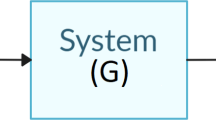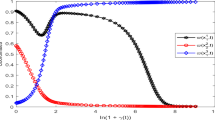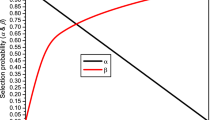Abstract
This paper investigates the robust strategy optimization problem for networked evolutionary games (NEGs) with pseudo-players and disturbance inputs using semi-tensor product of matrices, and presents a number of new results. First, we convert the evolutionary dynamics of the NEGs into an algebraic formulation. Secondly, we calculate the profile set in which the total payoff of the game will not less than a given value, and give two algorithms to find the largest robust profile control invariant set and the robust convergence region of this invariant set. Thirdly, the design method of profile feedback control, which can be used to regulate the strategies of the pseudo-players, is given to make the overall benefit of the game reach a certain threshold. Finally, an illustrative example is given to show the effectiveness of our main results.



Similar content being viewed by others
Code Availability
The code written for this study is available from the corresponding author on reasonable request.
References
Chen B, Chang C, Lee H (2009) Robust synthetic biology design: stochastic game theory approach. Bioinformatics 25(14):1822–1830
Cheng D (2014) On finite potential games. Automatica 50(7):1793–1801
Cheng D, He F, Qi H, Xu T (2015) Modeling, analysis and control of networked evolutionary games. IEEE Trans Autom Control 60(9):2402–2415
Cheng D, Li C (2021) Matrix expression of Bayesian game. http://arxiv.org/abs/2106.12161
Cheng D, Qi H, Li Z (2011) Analysis and control of Boolean networks: a semi-tensor product approach. Zidonghua Xuebao/Acta Automatica Sinica 37(5):1. https://doi.org/10.3724/SP.J.1004.2011.00529
Ellison G (1993) Learning, local interation, and coordination. Econometrica 61(5):1047–1071
Fornasini E, Valcher M (2020) Observability and reconstructibility of probabilistic Boolean networks. IEEE Control Syst Lett 4(2):319–324
Fu S, Li H, Zhao G (2018) Modelling and strategy optimisation for a kind of networked evolutionary games with memories under the bankruptcy mechanism. Int J Control 91(5):1104–1117
Fu S, Wang Y, Zhao G (2016) Strategy optimization of networked evolutionary games with bankruptcy mechanism. In: Proceedings of the 2016 35th Chinese Control Conference, Chengdu, pp 10351–10356
Han X, Chen Z, Liu Z, Zhang Q (2017) Calculation of siphons and minimal siphons in petri nets based on semi-tensor product of matrices. IEEE Trans Syst Man Cybern Syst 47(3):531–536
Hauert C, Doebeli M (2004) Spatial structure often inhibits the evolution of cooperation in the snowdrift game. Nature 428(6983):643–646
Le S, Wu Y, Sun X (2019) Congestion games with player-specific utility functions and its application to NFV networks. IEEE Trans Autom Sci Eng 16(4):1870–1881
Li A, Yong X (2014) Entanglement guarantees emergence of cooperation in quantum prisoner’s dilemma games on networks. SCI Rep-UK 4(1):6286
Li H, Xie L, Wang Y (2016) On robust control invariance of Boolean control networks. Automatica 68:392–396
Li Y, Ding X, Li H (2017) Robust consensus of networked evolutionary games with attackers and forbidden profiles. Entropy 20(1):15
Liu W, Pan Y, Fu S, Zhao J (2022) Strategy set and payoff optimization of a type of networked evolutionary games. Circ Syst Signal Process. https://doi.org/10.1007/s00034-022-02000-y
Liu X, Zhu J (2016) On potential equitions of finite games. Automatica 68:245–253
Lu J, Li B, Zhong J (2021) A novel synthesis method for reliable feedback shift registers via Boolean networks. SCI China Inform Sci 64(5):159–172
Lu J, Li M, Huang T, Liu Y, Cao J (2018) The transformation between the Galois NLFSRs and the Fibonacci NLFSRs via semi-tensor product of matrices. Automatica 96:393–397
Nowak M, May R (1992) Evolutionary games and spatial chaos. Nature 359(6398):826–829
Rafimanzelat M, Bahrami F (2019) Attractor stabilizability of Boolean networks with application to biomolecular regulatory networks. IEEE Trans Control Netw 6(1):72–81
Richard S (2001) Sociology and game theory: contemporary and historical perspectives. Theor Soc 30(3):301–335
Santos F, Santos M, Pacheco J (2008) Social diversity promotes the emergence of cooperation in public goods games. Nature 454(7201):213–216
Smith J, Price G (1973) The logic of animal conflict. Nature 246(5427):15–18
Szolnoki A, Wang Z, Perc M (2012) Wisdom of groups promotes cooperation in evolutionary social dilemma. Sci Rep-UK. https://doi.org/10.1038/srep00576
Tang Y, Li L, Lu J (2020) Modeling and optimization of a class of networked evolutionary games with random entrance and time delays. Chinese Automation Congress, Shanghai
Tembine H, Altman E, Azouzi R, Hayel Y (2010) Evolutionary game in wireless networks. IEEE Trans Syst Man Cybernet B 40(3):634–646
Von Neumann J, Morgenstern O (1944) Theory of games and economic behavior. Princeton University Press, Princeton
Wang J, Jiang K, Wu Y (2022) On congestion games with player-specific costs and resource failures. Automatica 142(110367):1–9
Wang Z, Szolnoki A, Perc M (2013) Optimal interdependence between networks for the evolution of cooperation. Sci Rep-UK 3(1):2470
Wu Y, Guo Y, Toyoda M (2021) Policy iteration approach to the infinite horizon average optimal control of probabilistic Boolean networks. IEEE Trans Neural Network Learn 32(7):2910–2924
Wu Y, Le S, Zhang K, Sun X (2021) Ex-ante agent transformation of Bayesian games. IEEE Trans Autom Control. https://doi.org/10.1109/TAC.2021.3122372
Xu X, Hong Y (2013) Matrix approach to model matching of asynchronous sequential machines. IEEE Trans Autom Control 58(11):2974–2979
Zhang J, Lou J, Qiu J, Lu J (2021) Dynamics and convergence of hyper-networked evolutionary games with time delay is strategies. Inf Sci 563:166–182
Zhao G, Wang Y (2016) Formulation and optimization control of a class of networked evolutionary games with switched topologies. Nonlinear Anal-Hybri 22:98–107
Zheng Y, Li C, Feng J (2021) Modeling and dynamics of networked evolutionary game with switched time delay. IEEE Trans Control Netw 8(4):1778–1787
Funding
This work was supported by the National Natural Science Foundation of China (Grant No. 62103176) and Natural Science Foundation of Shandong Province (Grant No. ZR2019BF023).
Author information
Authors and Affiliations
Contributions
Yuan Zhao and Shihua Fu performed theoretical analysis and wrote the first draft, Xinling Li wrote and modified the two algorithms, and Shihua Fu and Jianli Zhao contributed to the revision of the manuscript.
Corresponding author
Ethics declarations
Conflict of Interest
The authors have no conflicts of interest and did not perform research involving human participants and/or animals.
Additional information
Publisher's Note
Springer Nature remains neutral with regard to jurisdictional claims in published maps and institutional affiliations.
Rights and permissions
Springer Nature or its licensor holds exclusive rights to this article under a publishing agreement with the author(s) or other rightsholder(s); author self-archiving of the accepted manuscript version of this article is solely governed by the terms of such publishing agreement and applicable law.
About this article
Cite this article
Zhao, Y., Fu, S., Zhao, J. et al. Robust Strategy Optimization of Networked Evolutionary Games with Disturbance Inputs. Dyn Games Appl 14, 508–523 (2024). https://doi.org/10.1007/s13235-022-00473-9
Accepted:
Published:
Issue Date:
DOI: https://doi.org/10.1007/s13235-022-00473-9




